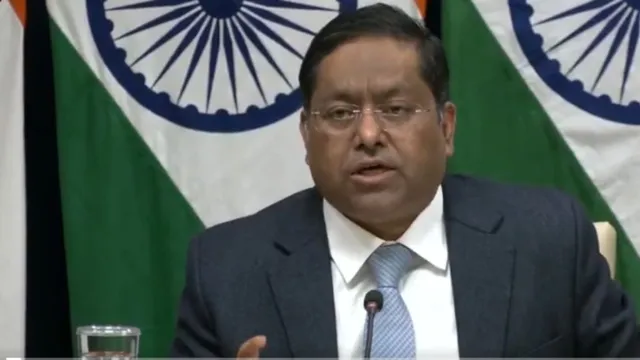- By Shivangi Sharma
- Thu, 21 Aug 2025 12:12 AM (IST)
- Source:JND
India has rejected Nepal's objection to the reopening of border trade with China using the Lipulekh Pass, labelling Kathmandu's argument as "untenable" and "not based on historical facts." The reaction follows after Nepal's Ministry of Foreign Affairs restated on Wednesday (August 20) that Limpiyadhura, Lipulekh, and Kalapani, regions situated east of the Mahakali River, are part of Nepal.
The row broke out after New Delhi and Beijing decided to resume border trade through three approved routes, Lipulekh Pass in Uttarakhand, Shipki La Pass in Himachal Pradesh, and Nathu La Pass in Sikkim. The trade routes were closed in last few years because of the Covid-19 pandemic and other logistical setbacks.
Our response to media queries regarding comments made by Nepal on border issue⬇️
— Randhir Jaiswal (@MEAIndia) August 20, 2025
🔗 https://t.co/0I3Es5UUfP pic.twitter.com/nxqFJtudGH
In response to Kathmandu's diplomatic objection, MEA spokesperson Randhir Jaiswal underlined that India's position has been steadfast. We have seen the statement of the Ministry of Foreign Affairs of Nepal regarding the reopening of border trade between India and China through the Lipulekh Pass. Our position on this has been clear and consistent.". Border trade via Lipulekh had started in 1954 and has been going on for decades. The trade was also disrupted on account of Covid and other events, and both parties have now agreed to start it again," Jaiswal said.
The controversy erupted after New Delhi and Beijing agreed to reopen border trade via three designated routes: Lipulekh Pass in Uttarakhand, Shipki La Pass in Himachal Pradesh, and Nathu La Pass in Sikkim. The trade routes had been suspended in recent years due to the Covid-19 pandemic and other logistical disruptions.
Reacting to Kathmandu’s diplomatic protest, Ministry of External Affairs (MEA) spokesperson Randhir Jaiswal emphasised that India’s stance has been consistent. “We have noted the comments of the Ministry of Foreign Affairs of Nepal related to the resumption of border trade between India and China through the Lipulekh Pass. Our position in this regard has been consistent and clear. Border trade through Lipulekh commenced in 1954 and has continued for decades. The trade was disrupted due to Covid and other developments, and both sides have now agreed to resume it,” Jaiswal said.
Why Lipulekh Is A Flashpoint
The Lipulekh Pass, located in the Himalayan region, connects India’s Uttarakhand state with Tibet in China. While India maintains historical trade ties through this crossing since 1954, Nepal argues that Lipulekh, along with the adjoining Kalapani and Limpiyadhura areas, falls within its sovereign territory.
The dispute gained visibility in 2015, when India and China agreed to expand trade via Lipulekh during Prime Minister Narendra Modi’s visit to Beijing. Nepal immediately lodged a diplomatic protest, claiming the agreement disregarded its territorial integrity.
Tensions escalated further in 2020 after India inaugurated a new road to Kailash Mansarovar via Lipulekh. In response, Kathmandu released an updated political map, incorporating Kalapani, Lipulekh, and Limpiyadhura into Nepal’s official territory, a move that sparked sharp reactions in New Delhi.
ALSO READ: Putin Surprises Alaska Man With New Bike After His Old Soviet Motorcycle Repair Story Goes Viral
Reiterating India’s position, the MEA underlined that Nepal’s objections lack a historical and legal basis. New Delhi considers Lipulekh a traditional trade and pilgrimage route, with cross-border movement continuing uninterrupted for decades until the pandemic-induced closure.

